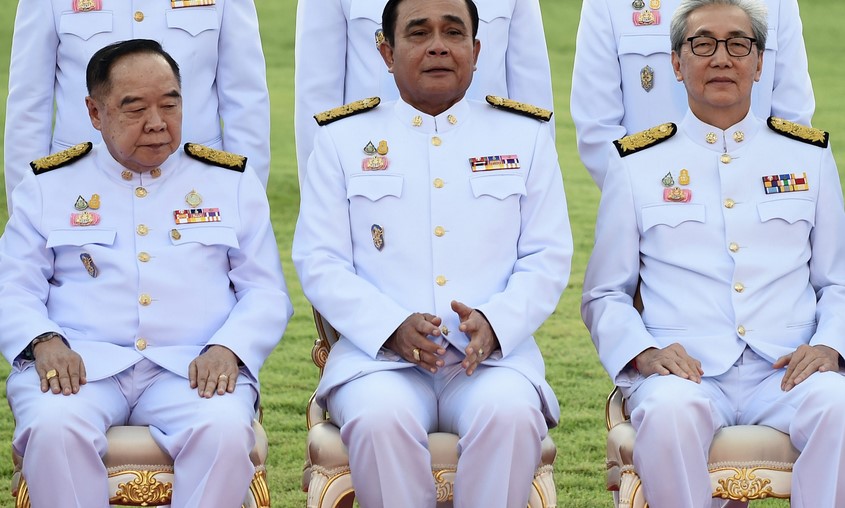
After the Constitutional Court delivered Thai Prime Minister Prayut Chan-ocha a not guilty verdict, members of the government and coalition members of Parliament warned opposition parties and others not to criticise the decision or face criminal prosecution.
The Court decided on Wednesday that the Prime Minister had not abused his power or registered a conflict of interest by residing in Royal Thai Army housing despite the fact that he had retired from the military. Specifically, Thanakorn Wangboonkongchana, a secretary to the Office of the Prime Minister, had warned Ratsadon and the Move Forward Party to not create trouble and respect the high court’s decision. The Court itself issued a statement urging people to avoid criticism that could lead to prosecution, noting that “a person shall enjoy the liberty to express opinions, but criticism of rulings made with vulgar, sarcastic or threatening words will be considered a violation of the law.”

The impermissibility of judicial criticism in Thailand is a growing concern and has been on the rise since the May 2014 coup d’etat swept Prayut and the military junta into power. Threats to critics have become commonplace. After the Constitutional Court suspended (and later banned) Future Forward Party leader Thanathorn Juangroongruangkit, Deputy Prime Minister Wissanu Krea-ngam in 2019 had also warned critics that they might face prosecution, after two academics were summoned by the Court for making comments critical of court decisions. Sarinee Achavanuntakul, an academic wrote an opinion piece in Krungthep Turakit arguing that judges were “careless” in their interpretation of election law after disqualifying a Future Forward Party candidate from running in the March 2019 election. Kovit Wongsurawat, a lecturer at Kasetsart University, also received a letter from the Court over an “inappropriate” tweet.
The use of contempt of court summons is alarming, and has been used in the same fashion as other draconian and authoritarian laws such as lese majeste and the Computer Crime Act to curb dissent. As a powerful tool in the government’s arsenal of political weapons, the Constitutional Court has the power to issue summons to anyone without due process. Guilt is determined on the spot. Due to a law that was enacted in 2019, anything deemed to be inappropriate criticism of the Court can be construed as contempt. Under Section 38 of the Organic Act on Procedures of the Constitutional Court, judges have the power to limit criticism–and have the authority to remand the accused to as much as a month in prison. This power, a thuggish attempt to call dissenters before the Court, abandoning all due process is akin to the junta’s cruel so-called “attitude adjustment” sessions, where critics were detained and interrogated at military camps. The threat of punishment, intimidation, and possibly direct forms of violence are implied. Intolerance of judicial criticism under regimes with absolute control over societies can lead to state-sanctioned violence.
Since 2014, the Constitutional Court has been working in lockstep with its authoritarian partners, enabling the return of military rule. It has used its authority to give legitimacy to undemocratic mechanisms, most notably the 2017 Constitution, by way of giving credibility to the deeply flawed constitutional referendum, as well as laws that further entrench the military-backed government in power, such as those that govern political parties, and the election of MPs. In fact, the Constitutional Court has been instrumental in weakening (and banning) opposition political parties, most recently targeting the Future Forward Party. It famously dissolved the Thai Rak Thai party in 2007, and in 2008 it banned then-Prime Minister Samak Sundaravej, over his appearance on a cooking show. In 2019, the court dismissed Thai Raksa Chart for being hostile to the monarchy after nominating the sister of King Vajiralongkorn, Ubol Ratana as a prime ministerial candidate.
In a democracy, healthy judicial criticism is normalized and stirs academic and legal debate over decisions that are often final. Activists, academics, and opposition parties who have legitimate criticism of the Court should not be intimidated with threats or imprisonment. A healthy civil society must be empowered with the right to express opinions in an academic or legal setting, or in forms that are more crude, such as satire and blunt criticism. The recent actions of the Constitutional Court, constitute another grave threat to free expression in Thailand. Like Prayut, who bristles when hit with legitimate criticism, the Court uses the same authoritarian tools to blunt their effect. Together, the Court and the regime are demanding no less than silence before, during and after a case appears before it. Contempt of court charges are normally reserved for instances where a case could be legitimately undermined or interfere with the Court’s ability to fairly conduct proceedings.
By leaning harder into intimidation, the Constitutional Court risks the further erosion of public legitimacy, as their actions chip away at what remains of democratic mechanisms in Thailand. Public reaction to the Prayut case, particularly by Ratsadon, is evidence of growing public distrust. Hopes are slim at the moment for a change in the Constitutional Court, as members have been handpicked by the government. This growing intolerance of judicial criticism is another painful reminder of how far Thailand has fallen and that this behavior by the Court has become normalized.






